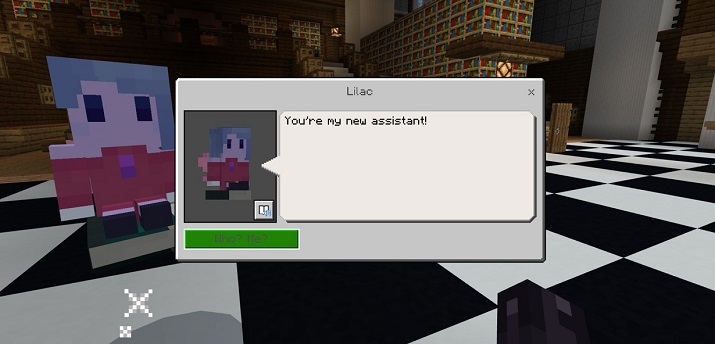There are five broadly defined prerequisites for effective learning: meaningful context, authenticity, motivation, freedom to make mistakes, and learner autonomy. Cambridge English teaching and learning materials harness the power of meaningful context and authenticity by presenting new language in a way that creates a genuine need to interact and communicate. And, as all teachers would attest, learners are most successful when they are motivated, free to learn from their mistakes, and take ownership of their own learning process.
So what do video games have to do with this? Well, in addition to the known benefits of games, video games support each of the building blocks of effective learning by providing:
- a strong and engaging narrative (context)
- purposeful interactions (authenticity)
- emotional engagement (motivation)
- freedom to fail (mistakes)
- opportunities for independent decision making (learner autonomy).
Context – A strong narrative
Context is the glue that helps us connect new information to what we already know about the world. This is why when we learn a language, we cover a series of topics like family, hobbies or holidays, instead of learning all of the words in the order that they appear in a dictionary starting with A and ending with Z. Without appropriate context, new information has nothing to attach itself to in our brain and becomes almost impossible to remember.
Video games set excellent context by providing a strong and engaging narrative, a story. Humans are wired to connect with stories. A strong narrative is compelling because it triggers an emotional response, which in turn makes it memorable. That’s why storytelling is such a powerful tool in marketing, politics, business and media. When teaching young learners, storytelling is vital: children rely on episodic memory much more than adults – remembering concrete facts and events they experienced that are linked together in learning.
Video games in general, and Adventures in English with Cambridge in particular, provide a strong and engaging narrative in which the player is intrinsically motivated to participate. How could they not be when they’re placed in the centre as the main protagonist? ‘Someone’s destroying my library, help me!’ pleads Lilac, ‘The stories need fixing, too!’

Authenticity – Purposeful interactions
We all know that being able to use the second language (L2) is more important than knowing facts about it. How often would you have to explain to a waiter in a foreign country which part of speech you are about to use when ordering a cup of coffee? Never – what matters is communication and meaning! ‘I’d like a cup of coffee, please,’ when sitting down at a table in a café. You wouldn’t expect the waiter to then reply, ‘Well done, that was the correct use of “would”!’ This is because in real life, we speak or write or read or listen when we have a need or a reason to do so – we call this ‘intrinsic motivation’.
Video games provide similar intrinsic motivation to communicate in a meaningful context. In our language-learning experience in Adventures in English with Cambridge , for example, the player will interact with Lilac, a fairy librarian in a giant library. ‘I’m thirsty! Can you bring me a hot drink?’ Lilac asks. To fulfil her request, the player will not need to complete a classroom-like vocabulary task. Instead, by exploring the beautiful library, the player will find a fully functional vending machine. Just like in real life, ‘milkshake’, ‘juice’ and ‘lemonade’ will be available for purchase, but the player will only hear the librarian say, ‘Ah, finally! It was delicious, thank you!’ when they bring her back a cup of coffee, rewarding the player with some more authentic language used in context.

Motivation – Emotional engagement
There’s a direct link between learner motivation and learning outcomes in and outside the classroom. Engaged learners are focused and curious, and generally do better than those who are disinterested or distracted. Video games are very good at leveraging the story, the challenges and the rewards within the game to trigger emotional response which is directly linked to motivation.
Inside our game in Minecraft, learners are motivated to solve the language puzzles because it ensures their progress within the game. They’re encouraged to persevere in their learning, both by the environment and the characters they meet. Players can choose which parts to pay most attention to, but they can’t avoid it. The language is built into the interactions within the game. To progress, players have no choice but to communicate … in English!

Mistakes help you learn – Freedom to fail
It might seem counter-intuitive, but when learning a language, mistakes can be beneficial when learners are given an opportunity to notice and reflect on them in a safe environment. Video games are excellent at providing plenty of safe opportunities to practise. In our Minecraft game, for example, players are free to wander off the wrong way or spell a word wrong. Instead of losing marks or progress, each mistake will result in more language input, to nudge learners towards the solution. This freedom to fail in video games is key to uninhibited language practice and is fundamental to our Adventures in English with Cambridge.
Autonomy – Independent decision making
Finally, in all kinds of teaching contexts, learner autonomy is another pillar of success. The more engaged the learner is in their own learning process, the more fruitful the results. In language-learning classrooms, learners are encouraged to develop study skills alongside listening, writing, speaking and reading – keeping consistent vocabulary notes, drawing mind maps, developing strategies for exam taking, listening and expeditious reading, to name just a few.
In video games, the process of becoming an independent decision maker is naturally fostered through the nature of the task in hand: the player has to discover ways out of tricky situations, frequently coming back to the starting point and starting all over again in order to progress within the game. In doing so, the players not only develop their sense of curiosity, but also perseverance, problem-solving skills and confidence, the usefulness of which stretches back to the classroom and beyond.

Explore our Minecraft world
Adventures in English with Cambridge is our exciting new world created by world-leading English assessment experts in collaboration with Minecraft. Inspire your young learners to develop their English skills beyond the classroom in a way they will never forget.
Play now
Listen to Maija and Alex talk more about our new Minecraft world and how it was created:
Pre A1 Starters, A1 Movers and A2 Flyers: What it’s like to take a Cambridge English Qualification